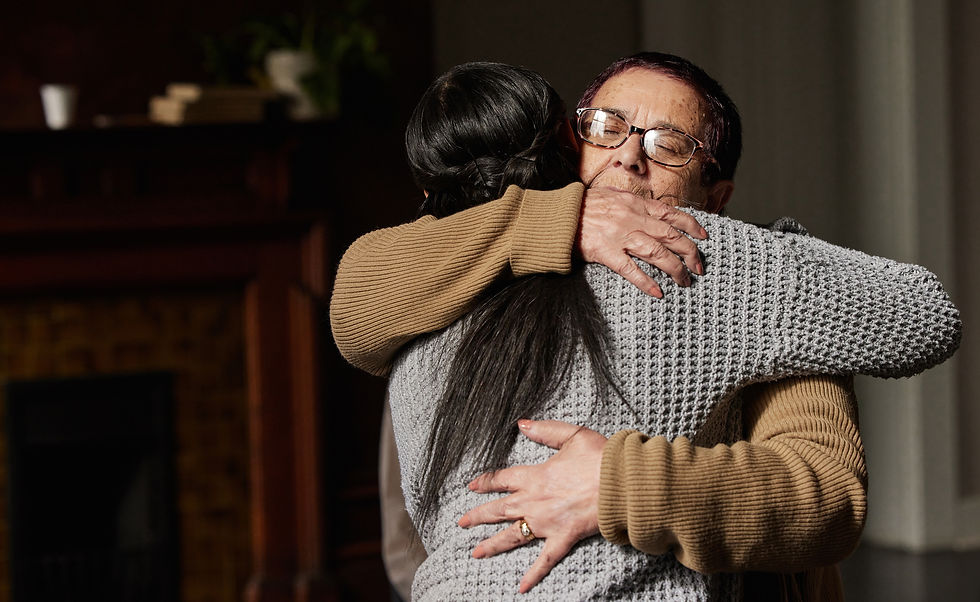The Life-Changing Power of Forgiveness: Free Yourself from Emotional Pain
- Apr 18, 2025
- 5 min read
Updated: Feb 9
Forgiveness is a powerful act that can bring you immense peace and healing. It’s not just about letting go of resentment; it’s about freeing yourself from the emotional burdens that weigh you down. When you hold onto grudges, you carry stress, anger, and negativity that can impact your mental and physical well-being. While forgiveness isn’t always easy, letting go can help you build emotional resilience, improve your relationships, and create a more fulfilling life. By forgiving, you break free from the cycle of pain and resentment, opening the door to healing, growth, and inner peace.
Find us wherever you listen:

Let’s discover why forgiveness is good for your mental health, why it can be difficult, and how holding onto hurt can damage your relationships.
Why Is Forgiveness Difficult?
Forgiving others can be challenging because it requires processing deep emotional wounds, often hindered by painful memories that reignite negative emotions. Sometimes, people’s fear of vulnerability makes trusting again difficult, and many, out of the desire for justice, may equate forgiveness with condoning harmful behavior. Additionally, ego and pride can create resistance, making it hard to acknowledge that forgiveness is necessary for healing. Despite these challenges, forgiveness is a conscious choice that leads to personal freedom. It is not about forgetting but about releasing the hold that pain has over you.
How Does a Lack of Forgiveness Impact Relationships?
Unforgiveness can create emotional barriers that damage personal and professional relationships, as holding onto grudges often leads to struggles with trust. Distrust can make it difficult to feel secure and open with others and foster resentment, causing emotional distance and straining connections. Poor communication fueled by unresolved anger prevents honest conversations and conflict resolution. Additionally, unhealed wounds may lead to projecting pain onto new relationships, unintentionally repeating harmful cycles.

What Happens When Pain Is Left Unaddressed?
Unaddressed emotional pain can significantly impact mental and physical health, often leading to distress in the form of anxiety, depression, or emotional numbness as a coping mechanism. It can also contribute to chronic stress, keeping the nervous system heightened and increasing the risk of fatigue and burnout. Additionally, unresolved pain may foster negative self-perception, causing feelings of unworthiness or self-doubt. Long-term resentment also has been linked to physical health issues such as high blood pressure, digestive problems, and weakened immunity.
How Can Openness to Forgiveness Help?
Embracing forgiveness fosters personal growth and emotional renewal by encouraging empathy, allowing us to see situations from another’s perspective and build deeper connections. It also restores inner peace by releasing resentment and emotional burdens, leading to greater mental clarity and freedom. By being open to forgiveness, you cultivate a more peaceful and fulfilling life, free from the emotional weight of past hurts. Developing a positive mindset can further support this journey, helping you embrace optimism and resilience.
Why Is Forgiveness Important for Others?
While forgiveness primarily benefits the one who forgives, its impact extends to those around them, creating a ripple effect of healing and growth. Demonstrating forgiveness fosters a culture of understanding, encouraging empathy and compassion in others while also opening the door for reconciliation and repairing damaged relationships. It can inspire personal accountability in those who have caused harm, promote positive behavioral change, and help break cycles of pain by preventing resentment from being passed down to future generations.

How to Practice Forgiveness
While forgiveness is a personal and sometimes challenging journey, here are 10 steps you can take to make the process more manageable:
Acknowledge the Pain – Recognizing and accepting your emotions is the first step toward healing. Suppressing your feelings can prolong resentment and prevent closure.
Understand the Impact – Reflect on how holding onto resentment affects your well-being, relationships, and overall happiness. This awareness can help you see the benefits of letting go.
Shift Your Perspective – Consider the situation from the other person’s viewpoint. Changing your viewpoint doesn’t mean excusing harmful behavior, but it can help you understand the factors that may have contributed to it.
Make the Choice to Forgive – Forgiveness is a decision. Decide that you no longer want to be burdened by the past, even if the other person has not apologized or changed.
Improve Emotional Intelligence - Take this free Emotional Intelligence Quiz to understand how your ability to manage emotions influences your approach to forgiveness. Strengthening emotional intelligence can help you navigate difficult emotions and move toward healing.

Practice Empathy and Compassion – Recognizing that everyone makes mistakes and has struggles can make forgiveness easier. Doing so doesn’t mean accepting ongoing harm but allowing room for growth.
Let Go of Expectations – Release any expectation of an apology or acknowledgment from the other person. Forgiveness is about freeing yourself, not about changing someone else.
Find a Healthy Outlet – Engage in activities that promote emotional release, such as journaling, therapy, or meditation. Talking with a trusted friend or professional can also help.
Be Patient with Yourself – Forgiveness is a process that takes time. Allow yourself to heal at your own pace without pressure or guilt.
Embrace Gratitude and Growth – Focus on the lessons learned from the experience and how they contribute to your personal growth. Practicing gratitude can help shift your mindset toward positivity and resilience.
Takeaways
Forgiveness is not always easy, but it is one of the most powerful tools for emotional well-being and relationship healing. By releasing resentment, we free ourselves from the weight of past hurts, allowing for greater peace, improved mental health, and deeper connections with others. While the journey to forgiveness may take time, the rewards—inner peace, emotional freedom, and stronger relationships—are well worth the effort.
References and Citations
Long, Katelyn N. G., Everett L. Worthington Jr., Tyler J. VanderWeele, and Ying Chen. “Forgiveness of Others and Subsequent Health and Well-Being in Mid-Life: A Longitudinal Study on Female Nurses.” BMC Psychology, vol. 8, 2020. Links forgiveness to improved psychological health and reduced stress.
Golen, Toni. “Not Just Good for the Soul.” Harvard Health Publishing, 2023. Explains how forgiveness supports heart health, lowers anxiety, and improves overall well-being.
Griffin, Brandon J., et al. “Forgiveness and Mental Health.” In Forgiveness and Health, edited by Everett L. Worthington Jr. et al., Springer, 2017. Describes forgiveness as a coping process that promotes mental resilience.
Akhtar, Sadaf, and Jane Barlow. “Forgiveness Therapy for the Promotion of Mental Well-Being: A Systematic Review and Meta-Analysis.” University of Warwick, 2016. Reviews evidence that forgiveness therapy decreases anger and psychological distress.
Toussaint, Loren, and Jon R. Webb. “Theoretical and Empirical Connections Between Forgiveness, Mental Health, and Well-Being.” Handbook of Forgiveness, Routledge, 2015. Explores how forgiveness alleviates stress and fosters life satisfaction.










